
Matthew 3 is the third chapter of the Gospel of Matthew in the New Testament. It is the first chapter dealing with the ministry of Jesus with events taking place some three decades after the close of the infancy narrative related in the previous two chapters. The focus of this chapter is on the preaching of John the Baptist and the Baptism of Jesus.

Matthew 5 is the fifth chapter of the Gospel of Matthew in the New Testament. It contains the first portion of the Sermon on the Mount, the other portions of which are contained in chapters 6 and 7. Portions are similar to the Sermon on the Plain in Luke 6, but much of the material is found only in Matthew. It is one of the most discussed and analyzed chapters of the New Testament. Warren Kissinger reports that among Early Christians no chapter was more often cited by early scholars. The same is true in modern scholarship.

Matthew 5:10 is the tenth verse of the fifth chapter of the Gospel of Matthew in the New Testament. It is the eighth verse of the Sermon on the Mount, and also eighth, and to some the last, of what are known as the Beatitudes.
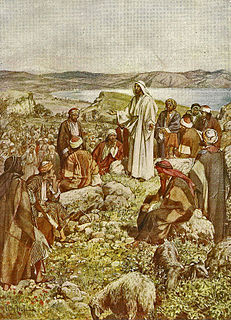
Matthew 5:20 is the twentieth verse of the fifth chapter of the Gospel of Matthew in the New Testament and is part of the Sermon on the Mount. Jesus has reported that he came not to destroy the law, but fulfill it. But in this verse, he makes clear that the common understanding of the Law is not enough.
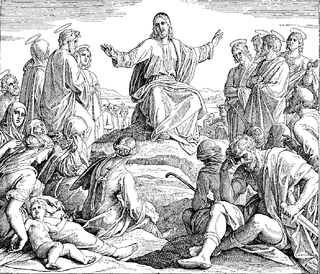
Matthew 5:43 is the forty-third verse of the fifth chapter of the Gospel of Matthew in the New Testament and is part of the Sermon on the Mount. This verse is the opening of the final antithesis, that on the commandment to "Love thy neighbour as thyself".

Matthew 6:1 is the first verse of the sixth chapter of the Gospel of Matthew in the New Testament and is part of the Sermon on the Mount. This verse begins the discussion of how even good deeds can be done for the wrong reasons.
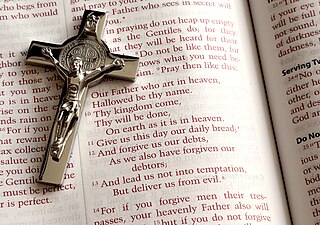
Matthew 6:14–15 are the fourteenth and fifteenth verses of the sixth chapter of the Gospel of Matthew in the New Testament and is part of the Sermon on the Mount. These verses come just after the Lord's Prayer and explain one of the statements in that prayer.

Matthew 6:18 is the eighteenth verse of the sixth chapter of the Gospel of Matthew in the New Testament and is part of the Sermon on the Mount. This verse concludes the discussion of fasting.
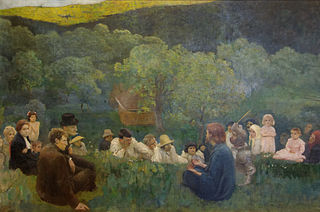
Matthew 6:25 is the twenty-fifth verse of the sixth chapter of the Gospel of Matthew in the New Testament and is part of the Sermon on the Mount. This verse shifts the discussion from one of money to one of worry.
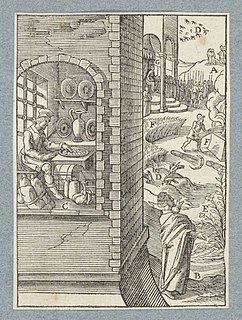
Matthew 6:26 is the twenty-sixth verse of the sixth chapter of the Gospel of Matthew in the New Testament and is part of the Sermon on the Mount. This verse continues the discussion of worry about material provisions. In this verse Jesus tells his followers not to be anxious about food, but to rely on God as the birds, who are worth far less than people, are fully provided for.

Matthew 6:31 and Matthew 6:32 are the thirty-first and thirty-second verses of the sixth chapter of the Gospel of Matthew in the New Testament and is part of the Sermon on the Mount. This verse continues the discussion of worry about material provisions.

Matthew 6:33 is the thirty-third verse of the sixth chapter of the Gospel of Matthew in the New Testament and is part of the Sermon on the Mount. This verse continues the discussion of worry about material provisions.

Matthew 7:11 is the eleventh verse of the seventh chapter of the Gospel of Matthew in the New Testament and is part of the Sermon on the Mount. This verse summarizes the preceding metaphors in favour of prayer.

Matthew 7:12 is the twelfth verse of the seventh chapter of the Gospel of Matthew in the New Testament and is part of the Sermon on the Mount. This well known verse presents what has become known as the Golden Rule.

Matthew 7 is the seventh chapter of the Gospel of Matthew in the New Testament. The chapter is the last of the three chapters which comprise the Sermon on the Mount.

Chapter 18 of the Gospel of Matthew contains the fourth of the five Discourses of Matthew, also called the Discourse on the Church. It includes the parables of the Lost Sheep and the Unforgiving Servant which also refer to the Kingdom of Heaven. The general theme of the discourse is the anticipation of a future community of followers, and the role of his apostles in leading it.

Matthew 7:21 is the twenty-first verse of the seventh chapter of the Gospel of Matthew in the New Testament and is part of the Sermon on the Mount. This verse continues Jesus' warning against false prophets.
Matthew 11:25 is a verse in the eleventh chapter of the Gospel of Matthew in the New Testament.
Matthew 10:22 is a verse in the ninth chapter of the Gospel of Matthew in the New Testament.
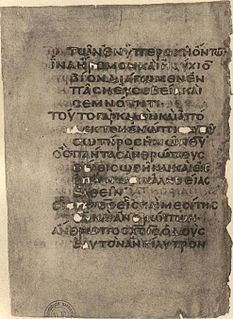
2 Timothy 2 is the second chapter of the Second Epistle to Timothy in the New Testament of the Christian Bible. The letter has been traditionally attributed to Paul the Apostle, the last one written in Rome before his death, addressed to Timothy. There are charges that it is the work of an anonymous follower, after Paul's death in the first century AD. This chapter contains the charge to Timothy, to pass on what has been entrusted to him to those who will teach others, to use the message of the gospel to contradict the opponent's teaching, and to counter heterodoxy.


















